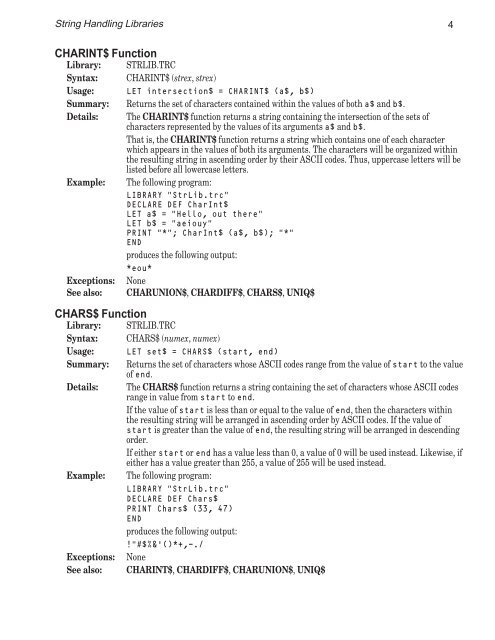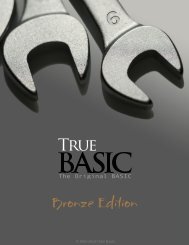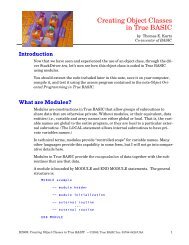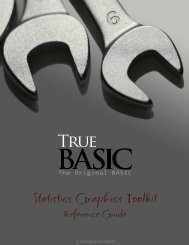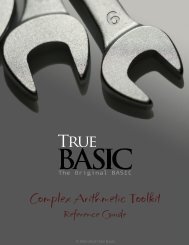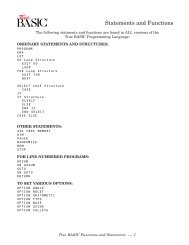Download the PDF documentation - True BASIC
Download the PDF documentation - True BASIC
Download the PDF documentation - True BASIC
Create successful ePaper yourself
Turn your PDF publications into a flip-book with our unique Google optimized e-Paper software.
String Handling Libraries 4<br />
CHARINT$ Function<br />
Library:<br />
Syntax:<br />
Usage:<br />
Summary:<br />
Details:<br />
Example:<br />
Exceptions:<br />
See also:<br />
CHARS$ Function<br />
Library:<br />
Syntax:<br />
Usage:<br />
Summary:<br />
Details:<br />
Example:<br />
Exceptions:<br />
See also:<br />
STRLIB.TRC<br />
CHARINT$ (strex, strex)<br />
LET intersection$ = CHARINT$ (a$, b$)<br />
Returns <strong>the</strong> set of characters contained within <strong>the</strong> values of both a$ and b$.<br />
The CHARINT$ function returns a string containing <strong>the</strong> intersection of <strong>the</strong> sets of<br />
characters represented by <strong>the</strong> values of its arguments a$ and b$.<br />
That is, <strong>the</strong> CHARINT$ function returns a string which contains one of each character<br />
which appears in <strong>the</strong> values of both its arguments. The characters will be organized within<br />
<strong>the</strong> resulting string in ascending order by <strong>the</strong>ir ASCII codes. Thus, uppercase letters will be<br />
listed before all lowercase letters.<br />
The following program:<br />
LIBRARY "StrLib.trc"<br />
DECLARE DEF CharInt$<br />
LET a$ = "Hello, out <strong>the</strong>re"<br />
LET b$ = "aeiouy"<br />
PRINT "*"; CharInt$ (a$, b$); "*"<br />
END<br />
produces <strong>the</strong> following output:<br />
*eou*<br />
None<br />
CHARUNION$, CHARDIFF$, CHARS$, UNIQ$<br />
STRLIB.TRC<br />
CHARS$ (numex, numex)<br />
LET set$ = CHARS$ (start, end)<br />
Returns <strong>the</strong> set of characters whose ASCII codes range from <strong>the</strong> value of start to <strong>the</strong> value<br />
of end.<br />
The CHARS$ function returns a string containing <strong>the</strong> set of characters whose ASCII codes<br />
range in value from start to end.<br />
If <strong>the</strong> value of start is less than or equal to <strong>the</strong> value of end, <strong>the</strong>n <strong>the</strong> characters within<br />
<strong>the</strong> resulting string will be arranged in ascending order by ASCII codes. If <strong>the</strong> value of<br />
start is greater than <strong>the</strong> value of end, <strong>the</strong> resulting string will be arranged in descending<br />
order.<br />
If ei<strong>the</strong>r start or end has a value less than 0, a value of 0 will be used instead. Likewise, if<br />
ei<strong>the</strong>r has a value greater than 255, a value of 255 will be used instead.<br />
The following program:<br />
LIBRARY "StrLib.trc"<br />
DECLARE DEF Chars$<br />
PRINT Chars$ (33, 47)<br />
END<br />
produces <strong>the</strong> following output:<br />
!"#$%&'()*+,-./<br />
None<br />
CHARINT$, CHARDIFF$, CHARUNION$, UNIQ$


